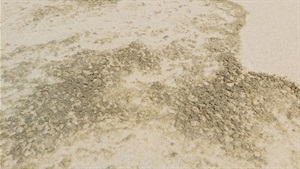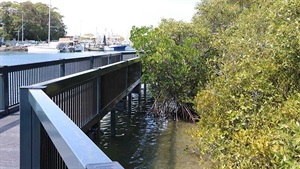Coast and waterways
Council's manages waterway health and public facilities along the Tweed River and our creeks.
For information about boat ramps, pontoons, jetties, canals and public foreshore see boating facilities and water recreation. The use of vessels on Tweed waterways is regulated by NSW Roads and Maritime Services.
Read more about how Council manages the 37 km of Tweed coastline.
Swimming after rain Beach foam Mangrove odours Report a problem
Swimming after rain
Our creeks, river and beaches are popular for swimming. But after heavy rain, stormwater runoff can bring in dirt, bacteria and other contaminants. This runoff comes from our towns, farms and bushland. It can carry bacteria from farm animals, wildlife, pets and humans.
Even if the sun is shining, bacteria levels can still be high following heavy rain, increasing the risk that people could become unwell because of swimming.
The level of risk to any individual person is affected by many factors, particularly their personal health.
Water quality changes constantly. One spot might have poorer water quality at low tide but be much cleaner a few hours later when the tide comes in.
Because conditions change so quickly, Council cannot provide accurate advice on water quality at any given time or location.
However, long-term testing shows that some waterways tend to have higher bacteria levels than others. Check out the results of monitoring in our waterway health report: Tweed Waterways Report 2021.
Generally, water is safest near creek and river mouths on an incoming tide.
Beach foam along the Tweed Coast

From time to time, brown foam collects on our beaches. It’s also known as beach scum.
Marine algae are always present along our coastline but sometimes, the amount of algae in our coastal waters increases greatly.
As the algae and other organic marine material breaks down, we may see unsightly brown foam on our beaches.
Because it can have a strong smell, it’s easy to mistake the foam as sewage or other pollution.
Past samples have contained marine algae and other naturally occurring organic marine matter including proteins, fats and dissolved salts.
The foam tends to be around for several days before gradually breaking down.
Is beach foam safe?
To help keep the places we live, work and visit safe, Council has commissioned the Tweed Laboratory Centre to test beach foam and rule out sewage and other pollution.
While beach foam occurs naturally, sometimes it may be potentially harmful with microbial and chemical contaminants, especially after heavy rain and floods.
Avoid touching and swimming in beach foam and keep your dog away.
Foam floating on sea water can hide underwater rocks from view.
Mangrove odours

If you smell an odour like rotten-eggs in our waterways, it may be mangroves.
Mangroves grow along the shores of our beautiful estuaries and wetlands. They have an important role in maintaining a healthy eco-system.
Sometimes, mangrove fruit emit a rotten-egg like odour when they decompose, usually from July to November.
It’s often mistaken for sewage odour but it isn’t.
The sulphide gas that’s produced is the same smell that can be given off by sewage gases.
There are no safety concerns.
Mangroves help cycle nutrients and provide a habitat for spawning fish, prawns and crabs. They also help stabilise and maintain the banks of our waterways and reduce the chance of tidal erosion.
For these reasons, mangroves are protected under NSW Government laws, and Council and the community have an important role in protecting this important part of our internationally significant environment.
Why does the smell sometimes intensify?
Mangrove fruit tend to fall and decompose between July and November each year.
Some mangroves can drop up to one kilogram of fruits and leaves per square metre a year - a lot of sulphide gas can be produced.
The closer you live, work or play near mangroves, the stronger the smell will be.
High tides and high river levels after rain tend to move the decomposing fruit around and potentially closer to houses.
The wind speed and direction can also have an impact.
Report a problem
Use the online form to report a problem relating to the Tweed coastline or waterways, such as erosion, pollution or an issue with a jetty.